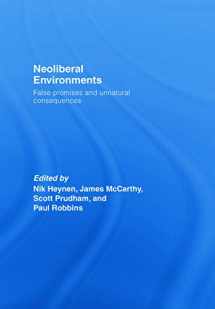
Neoliberal Environments: False Promises and Unnatural Consequences
ISBN-13:
9780415771481
ISBN-10:
041577148X
Edition:
1
Author:
Paul Robbins, Nik Heynen, James McCarthy, Scott Prudham
Publication date:
2007
Publisher:
Routledge
Format:
Hardcover
310 pages
Category:
Civil & Environmental
,
Geography
,
Earth Sciences
,
Human Geography
,
Social Sciences
,
Engineering
FREE US shipping
on ALL non-marketplace orders
Marketplace
from $73.20
USD
Marketplace offers
Seller
Condition
Note
Seller
Condition
Used - Good
May contain marks and or highlighting. Used items are NOT guaranteed to include components, i.e. CDs, Access codes, etc. Ships from our Kentucky facility. Ships same day if ordered before 1 PM EST, Monday - Friday. Contact us with any questions!
Book details
ISBN-13:
9780415771481
ISBN-10:
041577148X
Edition:
1
Author:
Paul Robbins, Nik Heynen, James McCarthy, Scott Prudham
Publication date:
2007
Publisher:
Routledge
Format:
Hardcover
310 pages
Category:
Civil & Environmental
,
Geography
,
Earth Sciences
,
Human Geography
,
Social Sciences
,
Engineering
Summary
Neoliberal Environments: False Promises and Unnatural Consequences (ISBN-13: 9780415771481 and ISBN-10: 041577148X), written by authors
Paul Robbins, Nik Heynen, James McCarthy, Scott Prudham, was published by Routledge in 2007.
With an overall rating of 3.6 stars, it's a notable title among other
Civil & Environmental
(Geography, Earth Sciences, Human Geography, Social Sciences, Engineering) books. You can easily purchase or rent Neoliberal Environments: False Promises and Unnatural Consequences (Hardcover) from BooksRun,
along with many other new and used
Civil & Environmental
books
and textbooks.
And, if you're looking to sell your copy, our current buyback offer is $0.3.
Description
This volume explores the nexus between nature, markets, deregulation and valuation, using theoretically sharp and empirically rich real-world case studies and analyses of actually existing policy from around the world and across a range of resources. In short, it answers the questions: does neoliberalizing nature work and what work does it do? More specifically, this volume provides answers to a series of urgent questions about the effects of neoliberal policies on environmental governance and quality. What are the implications of privatizing public water utilities in terms of equity in service provision, resource conservation and water quality? Do free trade agreements erode the sovereignty of nations and citizens to regulate environmental pollution, and is this power being transferred to corporations? What does the evidence show about the relationship between that marketization and privatization of nature and conservation objectives? Neoliberal Environments productively engages with all of these questions and more. At the same time, the diverse case studies collectively and decisively challenge the orthodoxies of neoliberal reforms, documenting that the results of such reforms have fallen far short of their ambitions.


We would LOVE it if you could help us and other readers by reviewing the book
Book review

Congratulations! We have received your book review.
{user}
{createdAt}
by {truncated_author}


